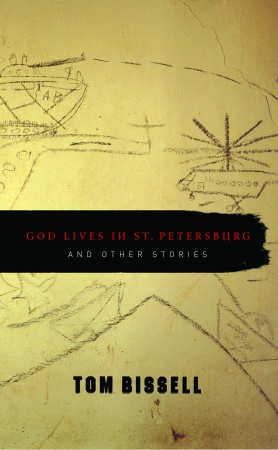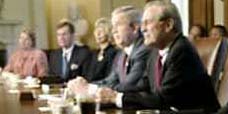
The narrator of ''Chasing the Sea'' was edgy and garrulous, if always engaging. In ''God Lives in St. Petersburg,'' Tom Bissell reveals himself to be not only a subtle craftsman but also a mordant observer of a new generation lost in a complex and dangerous world
'God Lives in St. Petersburg': Expensive Trips
By PANKAJ MISHRA
Published: February 27, 2005
IN his travel book, ''Chasing the Sea'' (2003), Tom Bissell described the extraordinary disappearance of Uzbekistan's Aral Sea: the Soviet Union, trying to divert water for cotton farming, had turned much of this large inland lake into a desert. Years earlier, Bissell had been a Peace Corps volunteer in Uzbekistan, but had returned home early for ''emotional and complicated'' reasons. A kind of helpless rage -- over both personal and national inadequacies -- drove ''Chasing the Sea'' and its detailing of the political and environmental devastation in the ''jigsaw of polysyllabic, hostile-sounding nations'' to the south of Russia. Bissell's first collection of short fiction, ''God Lives in St. Petersburg,'' deals mostly with Americans adrift in Central Asia; it also seems suffused by what one of his characters describes as ''the guilty futility one feels in countries less fortunate than America.''
In ''Aral,'' an American biologist named Amanda travels to the Aral Sea basin on behalf of the United Nations. She wishes to be as famous as Rachel Carson, Bissell writes, but ''mostly she crunched numbers'' and ''ran computer simulations that posited what would happen with no Aral Sea at all.'' Amanda ''e-mailed her findings to other biologists and tried to forget about the decades of pollution and insecticide and toxins in the Aral's exposed and windblown seabed.'' She also tried to forget about the thousands of children at risk for anemia.
The reader expects that this commonplace, career-obsessed academic, traveling with two colleagues she hates, will soon get her comeuppance in Uzbekistan. But it's still a bit surprising when a K.G.B. official, the father of children apparently blinded by the toxins of the Aral Sea, abducts her, ridicules her naïve nostrums for Uzbekistan -- charging citizens for water consumption -- and subjects her to an anti-American harangue. ''The difference between us, Professor, is that we know what suffering is,'' he begins. The official then accuses American businessmen of treating ''our women like cheap whores'' before going on to attack ''your corporations that take advantage of our workers while thinking we are too stupid to know the difference, your Peace Corps workers who castigate us as lazy and stinking. You have no tragedy and forget that such things exist, and if you know they do, you blame those whom the tragedy befalls. Americans are a people who've let their souls grow fat.''
The K.G.B. man proceeds to strand her in the desert. But Amanda's ordeal is not nearly as harsh as that of an American journalist, Donk, in the long story ''Death Defier.'' Donk, who ''believed in and tried to think about very little,'' thrives on the ''subterranean connections world media outlets had expertly tunneled beneath continents of human misery.'' His leg is blown off by an unexploded American bomb in Afghanistan.
In the title story, a tormented American missionary in a Central Asian city, who can't feel God anymore, ''though he could still hear him, floating and distant, broadcasting a surflike static,'' degenerates swiftly and nastily. In two stories, ''Expensive Trips Nowhere'' and ''Animals in Our Lives,'' relationships forged in America fail to survive exposure to foreign societies and cultures. Another story opens with the son of the American ambassador in a Central Asian country having sex with two Russian women as his mother walks into his room. (''Two chicks at once, Mom,'' he boasts before she kicks him out of his home.) He later kills a man during a drunken spree and, as the story ends, faces the prospect of prison.
Not since Paul Bowles, perhaps, has an American writer given his compatriots so hard a time in his fiction. None of Bissell's characters are very likable, and one feels relieved to have encountered them in a short story rather than a novel. As the Irish writer Frank O'Connor once pointed out, the short story accommodates misfits and outcasts -- people at the fringes of human society -- far better than novels do.
Bissell has a keen awareness of human loneliness -- what O'Connor defined as the mark of great short story writers. In the best of these stories, Douglas, ''a large, soft, American oaf'' from Manhattan who ''was never embarrassed to be an American, never hesitant to reveal his monolingual helplessness,'' goes on a hiking trip in Kazakhstan with his Midwestern wife, Jayne, and Viktor, a Russian soldier who now works as a tour guide. Alone in vast empty spaces, the three characters quickly discover unpleasant sides of each other's personalities. Jayne wishes to ''learn nothing new about the man she married.'' We see her through Viktor's eyes: ''Her face has the taut, squinty intensity Viktor knows well: the look of a worried American woman trying very hard to appear that she has seen it all.'' By constantly shifting the point of view, and by letting the reader enter the distrust and contempt each character secretly feels for the others, Bissell builds up to a terrific last scene in which Kazakh bandits abruptly appear.
With a pistol pointed at him, Douglas ''finds himself thinking of music, of poetry, of themes and motifs building to sensible effect. But life is not like that. Life is chaos. People are horrifyingly alive and unknowable.''
It was largely this awareness that in Paul Bowles's fiction repeatedly undermined, even deranged, travelers from the secure, highly organized societies of the West. But Bowles's post-World War II Americans moved through a politically placid world, more vulnerable to their own delusions than to the longings and frustrations of newly self-aware Asians and Africans. Writing in the 21st century, Bissell knows his characters cannot help identifying themselves, and being identified, with their country's great power and its diverse effect upon the world.
IN a bazaar in Kazakhstan, Douglas notices ''New York Yankees T-shirts which somehow incorporated into their design the Empire State Building, Dallas Cowboy knit hats emblazoned with a single red star, sweatshirts for nonexistent clubs like the Las Vegas Braves . . . all stitched from careless memory and a deep, nameless want.'' Bissell's characters are rarely able to see what war, poverty and corruption do to people in countries less fortunate than America. In Afghanistan, Donk seems wholly insensible, spiritually and emotionally, as he witnesses an American air strike, the ominous backdrop to life in that ravaged country: ''The great birds appeared with vengeful instantaneousness and screamed across the city sky. The sound was terrific, atmosphere-shredding, and then they were gone. The horizon, a few moments later, burped up great dust bulbs.''
Despite a fondness for words like ''rhomboids'' and ''lenticular,'' Bissell writes prose here as vivid and forceful as anything in his first book. The short story seems the right form for him; he artfully expresses the emotions stirred up by his own forays into the world outside America. The narrator of ''Chasing the Sea'' was edgy and garrulous, if always engaging. In ''God Lives in St. Petersburg,'' Bissell reveals himself to be not only a subtle craftsman but also a mordant observer of a new generation lost in a complex and dangerous world.
Pankaj Mishra's most recent book is ''An End to Suffering: The Buddha in the World.'' He is currently a fellow at the Dorothy and Lewis B. Cullman Center for Scholars and Writers at the New York Public Library.









